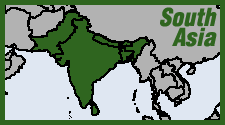 The landlocked Himalayan kingdom of Bhutan was traditionally isolated—only getting television as recently as 1999. Since opening up, alas, it has been increasingly drawn into the multiple armed conflicts rocking the greater region—especially becoming a staging ground for ethnic guerillas waging insurgencies for autonomy or separatism in India. Most recently, authorities in India are asserting that some of these guerilla armies are in league with Bhutanese cannabis growers to fund their armed struggles.
The landlocked Himalayan kingdom of Bhutan was traditionally isolated—only getting television as recently as 1999. Since opening up, alas, it has been increasingly drawn into the multiple armed conflicts rocking the greater region—especially becoming a staging ground for ethnic guerillas waging insurgencies for autonomy or separatism in India. Most recently, authorities in India are asserting that some of these guerilla armies are in league with Bhutanese cannabis growers to fund their armed struggles.
The most recent claims concern the National Democratic Front of Bodoland (NDFB), which is fighting for an ethnic homeland for the Bodo people of India's remote northeast (and has been implicated in some very ugly atrocities against local peasants who refuse to support them). Indian army operations against the NDFB are ongoing, with local media reporting a deadly clash in Assam state July 17. But India's authorities say the rebels are being resupplied from camps across the border in Bhutan.
The most recent claim of a cross-border cannabis connection to the guerillas came in late June, when a joint team of Indian army troops, Sashastra Seema Bal (border patrol) and Arunachal state police seized 300 kilos of herb in a raid on Boha village, West Kameng district, near the Bhutanese border. (Assam and Arunachal Pradesh are neighboring states that both border Bhutan and divide the Bodo ethnic territory.) "The operation broke the link between drug peddlers and rebel outfits like NDFB-S," a security source told India's TNN news agency, refering to the NDFB faction led by the commander known as Songbijit.
The source also reiterated claims that the rebels are being resupplied from Burma (Myanmar), but that a pot-for-guns pipeline across the Bhutanese border has now been established as well. "They have sent a distress call and asked other outfits in Myanmar to send them money. To earn some quick cash in the meanwhile, they have been trying to smuggle cannabis produced in Bhutan which is in high demand," the source said.
Cannabis is completely illegal in Bhutan, despite its prolific growth there—both cultivated and wild. Government eradication campaigns are vigorous but predictably futile—or worse. As always, it is ganja's illegality that allows the trade to be dominated by criminal outfits and guerilla groups—and the more official pressure on the herb, the more complete this domination will be.
Cross-post to High Times







Recent comments
4 weeks 6 hours ago
4 weeks 13 hours ago
7 weeks 1 day ago
8 weeks 13 hours ago
12 weeks 20 hours ago
15 weeks 6 days ago
19 weeks 6 days ago
20 weeks 4 days ago
30 weeks 4 days ago
34 weeks 5 days ago